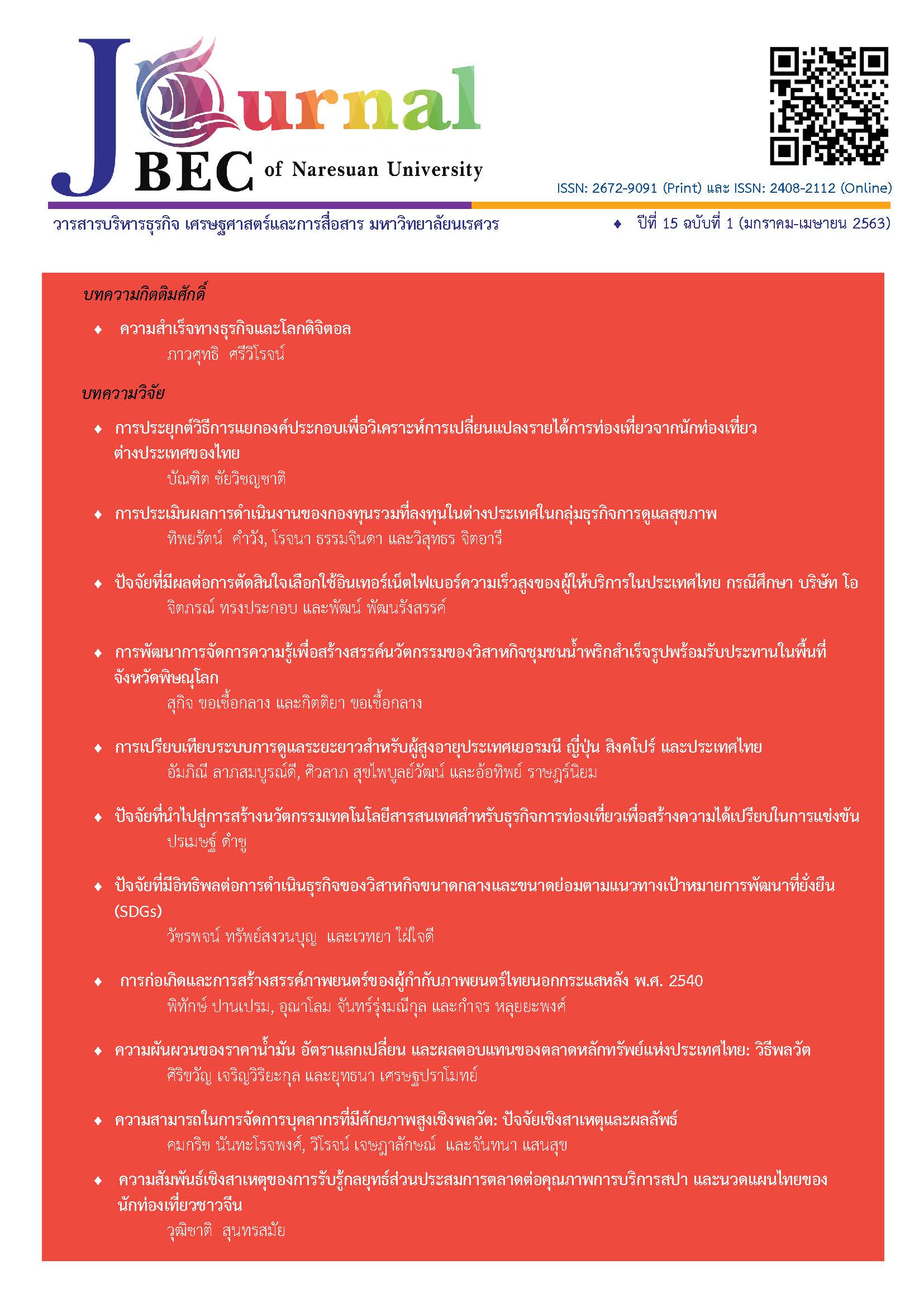การพัฒนาการจัดการความรู้เพื่อสร้างสรรค์นวัตกรรมของวิสาหกิจชุมชน น้ำพริกสำเร็จรูปพร้อมรับประทานในพื้นที่จังหวัดพิษณุโลก
Main Article Content
บทคัดย่อ
บทคัดย่อ
การวิจัยครั้งนี้ มุ่งเน้นการพัฒนาการจัดการความรู้เพื่อสร้างสรรค์นวัตกรรมวิสาหกิจชุมชนน้้าพริกส้าเร็จรูปพร้อมรับประทาน (กวชน.) ในพื้นที่จังหวัดพิษณุโลก มีวัตถุประสงค์ 3 ข้อ ดังนี้ 1) วิเคราะห์สภาพปัญหาและความต้องการ 2) วิเคราะห์การจัดการความรู้ และ 3) เสนอแนวทางการพัฒนาการจัดการความรู้สู่การสร้างนวัตกรรม เครื่องมือที่ใช้คือ การวิจัยเอกสาร การสัมภาษณ์แบบกึ่งโครงสร้าง และการสนทนากลุ่ม ผลการวิจัยพบว่า 1) สภาพปัญหา และความต้องการของ กวชน. บนพื้นฐานการวิเคราะห์ของบาลานซ์สกอร์การ์ด (Balanced Scorecard: BSC) ได้แก่ การเข้าถึงแหล่งงบประมาณ การท้าบัญชีอย่างเป็นระบบ การกระจายสินค้าสู่ลูกค้ากลุ่มวัยรุ่น และนอกพื้นที่ โรงเรือนส้าหรับการผลิต มาตรฐานของผลิตภัณฑ์ เครือข่ายที่สนับสนุนการตลาดและการพัฒนาทรัพยากรมนุษย์ อยู่ในระดับต่้า 2) การจัดการความรู้ในกรอบการแสวงหาความรู้ การถ่ายทอดความรู้ การแบ่งปันความรู้ และการประยุกต์ใช้ความรู้ กวชน. ทุกกลุ่มมีอัตลักษณ์เฉพาะของภูมิปัญญาท้องถิ่นในการผลิตน้้าพริก แต่ยังขาดระบบการจัดการความรู้ตั้งแต่การแสวงหา จนถึงการประยุกต์ใช้ 3) การพัฒนาการจัดการความรู้ ได้แก่ การพัฒนาอย่างต่อเนื่องของทรัพยากรมนุษย์ (ประธานและสมาชิก) และการสร้างเครือข่ายที่เข้มแข็ง
Article Details
เอกสารอ้างอิง
Alavi, M. and Leidner, D. E. (2001). Review knowledge management and knowledge management system. Conceptual Foundations and Research Issue, 25(1), 107-136.
Aujirapongpun, S. (2010). Knowledge management and innovation. Bangkok: Sam-Rada.
Bangmo, S. (2015). Organization and management. Bangkok: Withayapat.
Bunna, P., Wichiranon, S. and Ooaymaweerahirun, P. (2018). Potential of local wisdom and traditional food crops of Praknamdaeng community, Amphawa, Samutsongkhram. RMUTP Research Journal Humanities and Social Sciences, 3(1), 63-74.
Chaikate, S., Wongthai, S., Chaovanalikit, O., Pachekrepapol, U., Karawak, C. and Suriyasiributr, S. (2010). Chili paste consumption among consumers in Bangkok metropolitan. Srinakharinwirot University Journal of Science and Technology, 3(1), 63-74.
Food and Drug Administration. (2019). Good manufacturing practice: GMP. Retrieved June 2, 2017, from https://www.nfi.or.th/foodsafety/upload/qs/pdf/GMP_2.pdf
Janthawanit, S. (2555). Qualitative method (20th ed.). Bangkok: Chulalongkorn Publishing House.
Klangpraphan, W. and Veeranakhin, B. (2010). Knowledge management for local research to self-relevance based on philosophy of sufficiency economy, Ban Sahakorn sub-district, Mae-Oon district, Chiang Mai province. Bangkok: Thailand Research Fund.
Lung, L. Y., Hsu, M. S., Lin, F. J., Chen, Y. M. and Lin, Y. H. (2014). The effect of industry cluster knowledge management on innovation performance. Journal of Business Research, 67(5), 734-739.
Nonaka, I. (1991). The knowledge-creating company. Harvard Business Review, 69(6), 96-104.
Nonaka, I. and Takeuchi, H. (1995). The knowledge-creating company. New York: Oxford University Press.
Oliver, N., Dostaler, I. and Dewberry, E. (2004). New product development benchmarks: The Japanese, North American and UK consumer electronics industries. The Journal of High Technology Management, 23(1), 371-388.
Orburn, W. F. (1963). Social Change. New York: McGraw-Hill Book.
Pakawadee, P. and Inket, S. (2016). The foods set of Phitsanulok indigenous. Journal of Cultural Approach, 17(32), 3-16.
Pongpit, S. (2013). Daily-Siam-Rat; Opportunity knowledge-cost, available access. Retrieved June 2, 2017, from https://www.phongphit.com/2013/
Poster, M. E. (1990). The competitive advantage of nations. New York: Free Press.
Ryoko, T. (2003). Knowledge creation as a synthesizing process in knowledge management. Research and Practice, 1(1), 2-10.
Secretariat Office of Community Enterprise Promotion Board. (2007). Entrepreneur. Retrieved June 2, 2017, from www.sceb.doae.go.th
Snowden, D. (2003). Complex acts of knowing: Paradox and descriptive self-awareness. Journal of Knowledge Management, 6(2), 100-111.
Sutiwadthanaput, S., Pannilwongs, S. and Tansakun, S. (2013). Innovation leads a country through prospection. Bangkok: Thailand Future Foundation.
Suwannarat, T. and Thummikakul, N. (2010). Business plan of chili-dip in Phuket-brand. Research report, B.A., Silpakorn University, Nakhon-Pathom.
Tacharin, P. (2002). A way of strategy to implementation by Balanced Scorecard and Key Performance Indicators. Bangkok: Chulalongkorn Printing House.
Wasri, P. (2002). Human beiny way in 21st century through dimension of development (3rd ed.). Bangkok: Sodsri-Saridwongso Foundation.
Yodyingyong, K. (2009). Innovation organization: Concepts and process. Bangkok: Chulalongkorn University Printing House.


